Papers by rizalino noble malabed

Social Science Diliman 19:1, 2023
Martial law and state of emergency provisions in most constitutions have the same logic: in an em... more Martial law and state of emergency provisions in most constitutions have the same logic: in an emergency, they suspend the application of law to protect the lawful order. In the Philippines, these provisions can be traced to the 1916 Jones Law and manifested as the application of imperial violence on colonized peoples. After decolonization, this logic has escalated into a global trend of normalized emergency powers, reminding us of Benjamin's warning that the state of emergency in which we live is the rule. This essay follows Neocleous’ account of this development which he attributes to the liberal insistence that the law must be made sufficient for emergencies. This is provoked by the “Schmittian challenge”—the claim that emergency powers are the prerogative of the sovereign. But the dynamic of the liberal and Schmittian positions is what drives the process of normalizing emergency. Liberals fear the arbitrary exceptional powers invoked under martial law, so they encode these powers into law to enable an independent judicial oversight. Instead, this has normalized the acceptance and application of martial law and its associated powers. This essay asserts that Rodrigo Duterte’s drug war which is continuously waged by the present Marcos administration is normalized emergency.

Humanities Diliman 21:1, 2024
Several months into this return to a Marcos rule that we thought we had foresworn and forestalled... more Several months into this return to a Marcos rule that we thought we had foresworn and forestalled, we are yet to grapple with the slaughters and plunders of the past Duterte administration. But this present worrisome political regime is precisely enabled by the previous fatal Duterte government. To understand this Marcos regime, then, we must clarify the meaning of Duterte's rule with finality and demonstrate its place in the cycle of violence and corruption that is our politics. And so, we need to ask, what was/is the meaning of Duterte? To ask this question is to set aside the commonplace move of pointing to the obvious referent and thinking of the name "Duterte" as a sign. In this paper, we are particularly interested in the sign Duterte as indicating a coherent shared understanding and as a practical efficiency. As such, we examine two consistent meanings for Duterte: first, Duterte is the sign of the ideological deployment of middle-class fantasy, as both the bearer and the obscene means of our agencyborne of 1986 EDSA but subsequently lost. Second, Duterte is the name for the continuous experience of normalized emergency-specifically as state terror and militarized pandemic response.

Mabini Review, 2024
What is before and beyond our commonplace understanding of martial law as Marcos Martial Law? The... more What is before and beyond our commonplace understanding of martial law as Marcos Martial Law? The Official Gazette traces its beginnings in 1969 when Marcos Sr. boasted that martial law was a matter of when and where. But in a 1973 address, he credited the Americans for having made clear in the fundamental law the power of the chief executive to declare martial law. Marcos Sr.’s claims were self-serving, but he was correct in emphasizing martial law’s roots in colonialism. Martial law is an English and American colonial tradition and legal conundrum. It is foremost an instrument for empire and the subjugation of peoples in colonized territories. But it also raises questions and provokes disputes on its ambiguous but important standing within Anglo-American law. This essay examines this lineage by first exploring immediate questions: Is martial law law? Was its proclamation in 1972 legal as Marcos Sr. claimed? How can we make sense of his assertion that martial law was democratic self-defense? However, these questions transition into more fundamental ones:What was martial law’s role in colonialism? What were its specific practices? Is there a logic that governs these practices? This essay undertakes three things: First, it demonstrates connections between the terms that define martial law: exception/emergency, doubled rule of law, arbitrary power, and violence/terror. Second, it illustrates the continuities in the logic and repertoire of martial law whether deployed within the colonial and post-colonial. Third, it shows that martial law is not just Marcos Sr.’s but also Arroyo’s and Duterte’s, also Anglo-American and European colonialisms’—stained with an inequitable history, a depraved logic, and a repertoire of brutality.
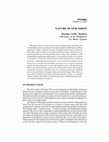
This paper aims to construct an account of valuing nature that takes into consideration its inter... more This paper aims to construct an account of valuing nature that takes into consideration its interest and asserts its representation within human political institutions. Value, a human concept, is fundamental to human relations. This paper seeks to apply a conception of value to nature that will serve to justify and guide our actions and interactions with it. Our condition is that of dependence and being within nature, conceived holistically as ecosystem or biosphere. As such, the whole of nature can be interpreted as a system of purposes—a Kantian natural purpose. Conceived in this manner, nature invites us to consider the possibility of seeing it as a recipient of moral action. As natural purpose, we are also asked to agree with the assertion that it acts autonomously, and that its action ends with the life-support system that sustains us. All these give us a conception of nature and of its interest as potentially belonging within societal institution. They allow us to ascribe to nature moral value and political agency. Thus, we conclude with two images that appear paradoxical but that would make final sense: us in nature and nature among us.
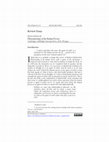
Filocracia, 2015
I think that it is symbolic to begin this review of Robert Sokolowski‘s Phenomenology ... more I think that it is symbolic to begin this review of Robert Sokolowski‘s Phenomenology of the Human Person with a quote of his declarative I, expressed and asserted as wish, that he deploys to begin the book. As we will learn, the declarative use of I manifests both its speaker and the thing that it speaks of. Hence, we can read it as Sokolowski wishing to be spoken or thought of as an agent of truth. And his book is an act that realizes his wish. 2Indeed the human person as the agent of truth is what the book speaks of, what it shows, and what finally manifests. But here I will arrest the flow of our thoughts as I wish to immediately juxtapose and entangle the agent of truth with its potential, its good, and its best. This is because the book as the culmination of Sokolowski‘s wish, intended and then acted, is a philosophical text and it shows precisely what the human person as agent of truth can be. To speak and write about the human person as an agent of truth is to speak and write philosophically:
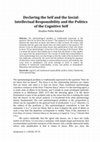
Symposion, 2018
The epistemological problem is traditionally expressed in the question " How do we know that we k... more The epistemological problem is traditionally expressed in the question " How do we know that we know? " The emphasis is on the relationship between the claim that we know and what it is that we know. We notice, only belatedly, that the agent who knows does not really matter in the question. The knower is but an abstracted entity whose only qualification is that s/he claims to know. Virtue epistemology's virtue lies in the centering of the knower: What is it about the knower that enables her to claim that she knows or that enables us to agree that she indeed knows? The concept of intellectual responsibility in virtue epistemology does not only brings us into the realm of the normative but also implicates, necessarily, the social and the political. Invoking the openness of alternative virtue epistemology to unconventional sources and methods, this essay turns to metaphysics and social ontology in order to explore the problems of intellectual responsibility, society, and politics in humankind's disposition and striving to know.
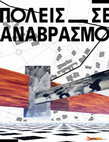
Πόλεις σε αναταραχή
Οι Φιλιππίνες κατά τη διάρκεια του στρατιωτικού νόμου και τη δικτατορία του Μάρκος αποτελούσαν πα... more Οι Φιλιππίνες κατά τη διάρκεια του στρατιωτικού νόμου και τη δικτατορία του Μάρκος αποτελούσαν παράδειγμα χώρου κυριαρχούμενου από το κράτος. Οι δρόμοι και οι πλατείες της Μανίλα και άλλες συνδεδεμένες μητροπολιτικές πόλεις ήταν «κλεισμένες, αποστειρωμένες και εκκενωμένες» καθώς πριν τη κήρυξη του στρατιωτικού νόμου το 1972 ήταν οι τόποι όπου λάμβαναν χώρα οι πολιτικές συγκεντρώσεις της αντιπολίτευσης∙ αρένες για φοιτητές κι εργάτες που μάχονταν εναντίον των όπλων, των γκλομπ και των αντλιών της Metropol (μητροπολιτική αστυνομία) με πέτρες, σφιγμένες γροθιές και την οργή τους∙ μέρη για ένα πλήθος χρήσεων που ένας λαός – που πάλευε να επιβιώσει οικονομικά, να διεκδικήσει τη νομιμότητα του κράτους, ή απλά συναναστρεφόταν ειρηνικά/ νόμιμα ή – φανταζόταν και ζούσε την καθημερινότητα. Οι δρόμοι και οι πλατείες της Μανίλα στα μέσα της δεκαετίας του ’60 μέχρι τις αρχές του ’70 βρίσκονταν σε αναταραχή, όπως ήταν οι δρόμοι σε πολλά σημεία του κόσμου. Η Πλατεία Μιράντα μπροστά από την παλιά εκκλησία Quaipo φιλοξενούσε ριζοσπάστες, μεταρρυθμιστές, πολιτικούς, πεζούς, μαχαιροβγάλτες, μετανοημένους, αυτούς που λένε τη μοίρα, πωλητές φίλτρων και φυλαχτών. Η κοντινή ζώνη του πανεπιστημίου και οι δρόμοι γύρω του – η τοποθεσία όπου βρίσκονται πολλά από τα πανεπιστήμια και κολλέγια της Μανίλα και μονοπάτι που οδηγεί κατευθείαν στην έδρα της εξουσίας (το Malacanang Palace) – ήταν σκηνικό διεξαγωγής συνεχών μαχών μεταξύ φοιτητών και αστυνομίας αλλά και μέρος μάθησης και μέθης, με τις μπυραρίες να βρίσκονται ένα βήμα από τις σχολές.
SURI, 2016
Is Niccolo Machiavelli's The Prince relevant in interpreting Philippine politics? Yes. But not th... more Is Niccolo Machiavelli's The Prince relevant in interpreting Philippine politics? Yes. But not the way we expect or have been told. Although Machiavelli advises the new prince to emulate the fox and the lion, he will not approve of our beastly politics full of buwaya, buwitre, baboy, ahas, and tuta. He will also not approve of our duplicitous system of politics wherein traditional political means beget putative democratic goals and democratic talk hides away the standard operating procedures of realpolitik. For Machiavelli, the new prince must eventually give way to citizens. But there is an impasse in this messianic task. In political history, the redeemer consumes his own children. Also, the state of political theory in Machiavelli's time cannot imagine citizens generating citizens. Did we succeed in doing such in 1986 EDSA?
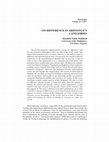
Recent theorizing has emphasized the concept of " difference " and how its normative deployment o... more Recent theorizing has emphasized the concept of " difference " and how its normative deployment orders our knowledge of the world. This ethical determination of how we know, however, is only half of a loop as difference has epistemological roots. It is precisely the concept's inherent connection to the epistemological demand that we must be certain of what we know that underprops it as a contemporary problematic. This demand is basic to philosophy since ancient times. We find it, for example, in the late Platonic dialogues Theaetetus and Sophist as Plato endeavors to define and account for knowledge and true belief. We also find this in Aristotle's Categories, which not only underpins his other philosophical works, but also founds the categorialism still current in philosophical thinking. We can think of categorial thinking as defining and structuring what we can know. And insofar as our knowledge guides our practice, categorial thinking also defines and structures our reality. In this essay, I perform a simple content analysis of the Categories. The aim is to look for difference and its variants, to count how many times they appear, to identify the general and specific contexts of their appearance, to find related terms and concepts in the specific context of the sentences that they appear in. The essay's analyses try to find explanations as to what Aristotle's concept of difference is, as to what Aristotle think of it as it appears in various contexts in the Categories, as to how it reflects the structure of our knowledge of the world, and as to how it likewise reflects the manner by which we attempt to structure or order our world. Philosophizing nowadays, especially of the postmodern/poststructuralist variants (also appearing in sublimated or less radical form in liberal theorizing), has severed the problem of difference from its epistemological roots and focused primarily on its effects on discourse and power—how it constitutes knowledge and how it rationalizes the ordering of society through force, consent, and the care of the plurality of selves. 1 Among its many nuances: Difference is the (remarking g of words, the fixing of meanings, the identification of natures. It is also the deferring
One can argue that the problem posed by difference/identity in contemporary philosophy has its ro... more One can argue that the problem posed by difference/identity in contemporary philosophy has its roots in the persistent epistemological imperative to be certain about what we know. We find this demand in Plato's Theaetetus and Sophist. But beyond this demand, there is a sense in the earlier dialogue that difference is not a passive feature waiting to be identified. " Difference " points towards an active differentiating. In the Sophist, difference appears in the method of dividing and gathering deployed to hunt for the elusive " sophist. " Difference is also one of the great kinds that weaves together other kinds. Practically, difference enables the sophist's expertise of appearance-making as he knowingly confuses things with words. This paper then quizzes the concept of difference in all these guises in the two dialogues.
In his Critique of Judgement, Immanuel Kant claims that judgement provides (1) a transition from ... more In his Critique of Judgement, Immanuel Kant claims that judgement provides (1) a transition from the theoretical to the practical and unifies philosophy and (2) the principles for an alternative politics and founds the ideal political community. Vital to understanding Kant's second claim is the idea of sensus communis, which arises from his contention that the judgement of taste appears as universal because taste not only presupposes common sense but is also community sense. This article shows that in his discussion, which moves from reflective judgement, to the judging subject, and to the sensus communis, Kant argues for a potential for politics and a sense of political community wherein the two claims on judgment imply each other.
Focusing initially on two major multilateral environmental conventions, this initiative is motiva... more Focusing initially on two major multilateral environmental conventions, this initiative is motivated by the conviction that knowledge-driven strategies must be accompanied by effective on-the-ground measures, and that the interests of states and all other stakeholders involved must be taken into account.
This policy brief examines how the inter-linkages approach to sustainable development governance ... more This policy brief examines how the inter-linkages approach to sustainable development governance can be used to help make sustainable development financing more effective and efficient.
Inter-linkages is a strategic approach to managing sustainable development that seeks to promote greater connectivity between ecosystems and societal actions. On a practical level, this involves a greater level of cohesiveness among institutional, environmental issue-based, and development-focused responses to the challenges of sustainable development, and among the range of international, regional, and national mechanisms that share this challenge.
Publications in the UNU discussion paper series represent interim reports on the concept and prac... more Publications in the UNU discussion paper series represent interim reports on the concept and practice of environmental management, environmental information and related fields. They are circulated in a limited basis in their pre-publication form to stimulate discussion and critical comment. The views and opinions expressed in these papers are those of the authors and do not necessarily reflect those of the United Nations University and the Global Environment Information Centre.
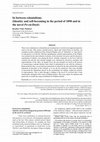
There were continuities in colonial discourse and practices even between supposed opposites such ... more There were continuities in colonial discourse and practices even between supposed opposites such as the late 19th century colonial powers, Spain and United States of America. An example was their exhibition of the colonized Filipino other as “barbarian” or “uncivilized” in expositions or world fairs. But this unambiguous colonial representation of the Filipino was confused in the anti-colonial revolution, as the structures for power and for discursive constitution of identity were among the prices violently contested. At one level, both the colonial rule and the anti-colonial struggle were informed by discursive strategies and representations of the other. At another level, the anti-colonial was itself in the process of constructing a national identity from which it rationalized its war with the colonizers. Representation, thus, was as much an instrument of control for the anti-colonial that sought hegemony in the place of the colonial, as it was for the colonizers. This essay attempts to transcend the limitations placed on the possibilities for identity within the practice of representation. This is done through a reading of the novel Po-on/Dusk that is then intentionally entangled with events in Filipino history. This essay argues for openness and generosity to sustain the many possibilities for Filipino identity.

The theory practiced as resistance must come to grips with the state and with revolution. To evad... more The theory practiced as resistance must come to grips with the state and with revolution. To evade, explain away, or assume the state is fatal. And to think of revolution only as anti-state is as dangerous. After all, the revolution’s aftermath is revealed by history to be just another state. I argue that the danger posed by both state and revolution can be countered by the multiple in society that becomes contentious—or a contentious multiplicity. The multiple and the contentious are practices that pervade society. The state’s objective is to control multiplicity and sublimate contentiousness. The revolutionary strategy is to sublimate multiplicity and direct contentiousness. But multiplicity is dangerous when it is independently contentious. And contentiousness indicates a dialectical process of challenging state power wherein the process itself is privileged over any synthesis. Contentious multiplicity is a practice of freedom.
The Hobbesian social contract is effectively a repudiation of politics. And the story of humanity... more The Hobbesian social contract is effectively a repudiation of politics. And the story of humanity that it tells is that of alienation. The multitude left politics behind in the state of nature, demarcating it as the power and domain of the Sovereign, as they surrendered their political capacities—their wills and judgments—to constitute the commonwealth. What they got in return is the guarantee to safely pursue the necessities of life. Thus, the politics of the modern state applied to subjects has always been the administration and care of mere life. This interpretation of Hobbes depends on a Hegelian and Arendtian reading of Hobbes.
published as:
“Leaving politics behind: An Arendtian and Hegelian reading of Hobbes,” in Φιλοσοφια (Philosophia), Philosophical Association of the Philippines (PAP), Quezon City: Ample Press; Issue 1, Jan-June 2012
Books by rizalino noble malabed

upd dissertation, 2019
Two urgent questions impel this thinking of thinkable politics: How did we get from EDSA to Duter... more Two urgent questions impel this thinking of thinkable politics: How did we get from EDSA to Duterte? What can I do? These questions are wistfully underpinned by a third: Whatever happened to my/the politics that, for me/for a multitude, was compelled by EDSA and cannot be other than emancipatory? These are obviously practical questions. However, they are also eminently and imminently theoretical. Thus, reiterated philosophically: What explains this moment of danger that has taken hold of our present? What is the politics adequate to this danger but at the same time excessive of the persistent moment, so much so that it explodes this untenable reality and open our present to the trajectory of the new? The philosophical answer is provided by Walter Benjamin’s assertion that the state of emergency that we live is not the exception but the rule, and his revelation that it is our task to bring about a real state of emergency that will help the fight against fascism. Dito sa bayan nating sawi,* the contention is that the state of emergency that is the rule is normalized emergency. This normalized emergency is structured by middle class fantasy production post-EDSA. Only the naming of EDSA as an event and the militants for its truth are what can measure up to this normalized emergency and its organizing fantasies.—These assertions are explored through Giorgio Agamben’s concept of exception, Slavoj Zizek’s concept of fantasy, and Alain Badiou’s metaontology and his concepts of event and subject. The point, as was Benjamin’s, is to improve our position in our fight against this contemporary conflation of state terror and fantasy bewitchment that is named Duterte.
* here in our unfortunate country
The thesis uses content and discourse analyses to compare 1992 UNCED documents with texts from th... more The thesis uses content and discourse analyses to compare 1992 UNCED documents with texts from the parallel Global NGO Forum. The objective is to establish global society influence on the UN process. The thesis naively deploys Gramsci and Habermas to explain the concept and practice of global society. It also follows John Dryzek’s characterization of the global environmental politics and discourse. The thesis was published by the United Nations University (UNU) and Global Environment Information Center (GEIC, now Global Environment Outreach Center) in 2002.
Critically acclaimed erudite zine back by popular demand! Now on its 2nd edition.
Kahanga-hanga... more Critically acclaimed erudite zine back by popular demand! Now on its 2nd edition.
Kahanga-hanga ang kanyang mga bullshit! Marami tayong matututunan, parang sa eskuwelahan. –Anonymous reviewer
Kapangalan niya dating prop ko. Sing-galing din niya! –Estudyanteng 10-taon na sa elbi
This is sharp. Sharp like a knife. How will I ever heal? I’m so deeply wounded. –Critically acclaimed author in Philosophy, also a song

Uploads
Papers by rizalino noble malabed
Inter-linkages is a strategic approach to managing sustainable development that seeks to promote greater connectivity between ecosystems and societal actions. On a practical level, this involves a greater level of cohesiveness among institutional, environmental issue-based, and development-focused responses to the challenges of sustainable development, and among the range of international, regional, and national mechanisms that share this challenge.
published as:
“Leaving politics behind: An Arendtian and Hegelian reading of Hobbes,” in Φιλοσοφια (Philosophia), Philosophical Association of the Philippines (PAP), Quezon City: Ample Press; Issue 1, Jan-June 2012
Books by rizalino noble malabed
* here in our unfortunate country
Kahanga-hanga ang kanyang mga bullshit! Marami tayong matututunan, parang sa eskuwelahan. –Anonymous reviewer
Kapangalan niya dating prop ko. Sing-galing din niya! –Estudyanteng 10-taon na sa elbi
This is sharp. Sharp like a knife. How will I ever heal? I’m so deeply wounded. –Critically acclaimed author in Philosophy, also a song
Inter-linkages is a strategic approach to managing sustainable development that seeks to promote greater connectivity between ecosystems and societal actions. On a practical level, this involves a greater level of cohesiveness among institutional, environmental issue-based, and development-focused responses to the challenges of sustainable development, and among the range of international, regional, and national mechanisms that share this challenge.
published as:
“Leaving politics behind: An Arendtian and Hegelian reading of Hobbes,” in Φιλοσοφια (Philosophia), Philosophical Association of the Philippines (PAP), Quezon City: Ample Press; Issue 1, Jan-June 2012
* here in our unfortunate country
Kahanga-hanga ang kanyang mga bullshit! Marami tayong matututunan, parang sa eskuwelahan. –Anonymous reviewer
Kapangalan niya dating prop ko. Sing-galing din niya! –Estudyanteng 10-taon na sa elbi
This is sharp. Sharp like a knife. How will I ever heal? I’m so deeply wounded. –Critically acclaimed author in Philosophy, also a song
Along the way, the act of freedom that was the first EDSA became an annual celebration that reduced it into a spectacle: something that we watch rather than do. And the people that was the subject of an overwhelming and transforming power was split, first, in EDSA 2 and, then, in the disavowed EDSA 3. What is left is the middle class frantically grasping for the now untenable fundamental fantasy of lost agency, and nostalgic for that impossible subjectivity of immense power on the verge of creating a new world.